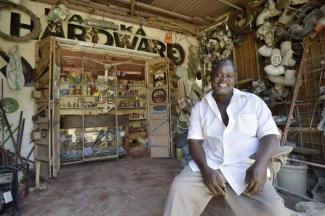Disabilities
Inclusion counts

Can governments afford to keep men, women, girls and boys with disabilities excluded? The answer is “no”. Indeed, society as a whole benefits from inclusion, and that is true even of the poorest countries. This is the message of the new publication with the title “Inclusion counts”, and it fits the mission of CBM. The book is based on research done by the London School of Hygiene & Tropical Medicine and the practical experience of CBM.
The book proves that it pays to invest in inclusion. When people with disability are financially independent, that reduces the burden on their communities and society as a whole. They persons concerned require less support from their families, so relatives have more time for productive work. As a result, gross domestic product (GDP) and even tax revenues rise. In countries with low and middle incomes, GDP can grow by up to seven percent.
The book contains solid data to prove what were so far merely theoretical hypotheses regarding the interaction of disabilities and poverty. People with disabilities typically belong to the poorest segments of society and they are excluded from important spheres of life.
Things are particularly tough in developing countries. Though inclusion is explicitly defined to be a human right in the UN Convention on the Rights of Persons with Disabilities, it is still hard to challenge the wide-spread notion of disability-inclusive development being expensive and difficult to bring about.
Of causes and costs
The CBM book challenges such ideas. It spells out what costs arise for the people affected, their families and society in general. Mind sets matter too. In some cultures, disabilities are seen as a punishment for sins. Accordingly, people shy away from seeing doctors or sending their children to school. Moreover, political will tends to be lacking. In some word regions, people with disabilities have no access to health care, schools, public transport or jobs.
When the youngsters concerned are denied an education, however, most of them will stay excluded from the labour market as adults. Escaping poverty becomes ever more difficult, and the costs of exclusion are multiplied. If however, the persons concerned get an education, their chances of finding employment, making money and fending for themselves improve.
Once marginalised, now shop owner
One example of how inclusion serves many persons is the story of Someon Otieno from Kenya. It is told in the book. Due to a polio infection at an early age, the 48 year old man from Mombasa has a walking disability. Nonetheless, he managed to start his own business. Nobody was willing to lend him money – apart from a local partner organisation of CBM. Today, Otieno is running a small hardware store. He is not only taking care of his seven-member family, but also providing employment to 13 persons.
His fate is only one of many examples discussed in the book. CBM activists, moreover, give insights into their projects – for instance in regard to helping people with disabilities get access to financial services. They managed to convince Equity Bank, the major bank in Kenya, to run a programme that caters to clients with disabilities. Equity Bank is thus contributing to other financial institutions reconsidering their approach.
While there are many success stories, inclusion can still not be taken for granted. CBM therefore demands that governments must rise to their duties to ensure equal opportunities. It is important to understand that inclusion and participation are not just a matter of charity. They are a demand of justice, and they result in economic benefits.
Esther Dopheide, CBM
Link
CBM, 2016: Inclusion counts – The economic case for disability-inclusive development.
http://www.cbm.org/article/downloads/54741/DID_series_2_-_Inclusion_Counts__coming_soon_.pdf












